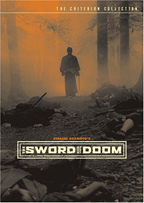

Dai-bosatsu tôge
Japan 1966
Genre:
Action, Drama
Director:
Kihachi Okamoto
Cast:
Tatsuya Nakadai
Michiyo Aratama
Yûzô Kayama
Yôko Naitô
Tadao Nakamaru
Kei Satô
Kô Nishimura
Ichirô Nakatani
Kunie Tanaka
Ryôsuke Kagawa

The Sword of Doom
Story: Ryunosuke Tsukue (Tatsuya Nakadai) is an excellent swordsman, but has been cast out of his school. His sword fighting style
is extremely unusual and because of his extraordinary skills he is pleaded by Ohama (Michiyo Aratama) to purposely lose in his impending duel against
her husband Bunnojo Utsuki since otherwise Utsuki couldn't take over his master's school. Ryunosuke agrees if she in return gives up her chastity.
But Utsuki finds out about this deal and in the following duel wants to take Ryunosuke's life leading to him being slain himself. Since the family
of dead Utsuki, especially his brother Hyoma (Yûzô Kayama), is seeking revenge Ryunosuke starts wandering the country and from that day on lives
together with Ohama. He works as a mercenary for a group that is later known as the Shinsengumi, a group that supports the Tokugawa shogunate.
Ryunosuko's soul is eaten up by darkness with every passing day and his path doesn't only cross that of Hyoma but also the one of Omatsu (Yôko Naitô)
whose grandfather he killed.
Review: This character-focused samurai movie that depicts a journey into the depth of a villain's soul and thus breaks with
familiar viewing habits was originally planned as a series of movies but unfortunately there never was any sequel. Therefore, the biggest
downside of this classic is that it has an open end. This is even the more frustrating as the character development in the movie is very well done
and we are actually interested in getting to see how Ryunosuke is haunted by his own demons and if fate has rightful punishment in store for his
sins. The supporting characters are drawn out well, too, and there are some subplots that at first may interfere with the flow of the film but in the
end give the story more color.
Thus, it is even the more tragical when all the loose ends remain unsolved. Since the movie is based on a novel by Kaizan Nakazato at least those
fluent in Japanese could dive deeper into the story. If you are willing to read one of the longest novels in history (with over 1100 pages) that
is.
The viewer is presented with a complex plot in "The Sword of Doom" whose individual story threads are skillfully woven into one another. At first
those connections aren't apparent at all and you even start to wonder why the film's focus can't just stay with Ryunosuke but as the movie progresses
the necessity of the subplots becomes obvious and when at the end they slowly grow into one single whole they actually add to the main plot.
"The Sword of Doom" without a doubt owes a lot to Tatsuya Nakadai's portrayal of the villain. Everything of his being seems to be corrupted, even his
sword fighting style. He is a killer and a man nothing is sacred to. And yet he is also a fascinating character who seems to have been forced into
his role somehow without really wanting it. It's also difficult to describe what kind of feelings you as the viewer are supposed to have towards
this samurai. It isn't pity, instead we even would like to see him get his rightful punishment and yet he is an individual that has aroused our
curiosity. Seldom you get to see a villain so well fleshed out as is the case with Ryunosuke.
Besides, the film also stands out from other samurai pictures because of its fantastic cinematography. Unforgettable is the scene in which the
samurai walks through a forest and thin fog rises from the forest floor while he gets attacked by several enemies. The movie's body count is
pretty high by the way but the level of violence is rather modest with the exception of only a few scenes. The fights are sometimes rather long,
even though Ryunosuke always needs just a single blow to strike down a foe. The amount of enemies is what's keeping the tension high. Sadly, the
film lacks a foe that is working on the same level as the samurai. Apparently such an enemy is just what was intended for a sequel.
In a few wonderful scenes the contrast between light and shadow is excellently brought to bear. In a black-and-white movie this naturally creates
a special flair. This works out especially well towards the end when the samurai has to face his inner demons and slowly is about to dive into madness.
The soundtrack also creates a very disturbing and almost creepy atmosphere. More than anything else it's the tense atmosphere that can make you overlook
certain lengths and the slow overall pacing of the movie. At the end the biggest flaw of this character-orientated samurai drama is its
fragmentariness. Apart from that "The Sword of Doom" is a recommendable classic.

Disclaimer





















